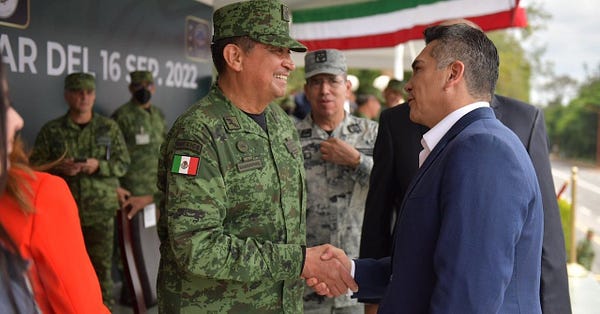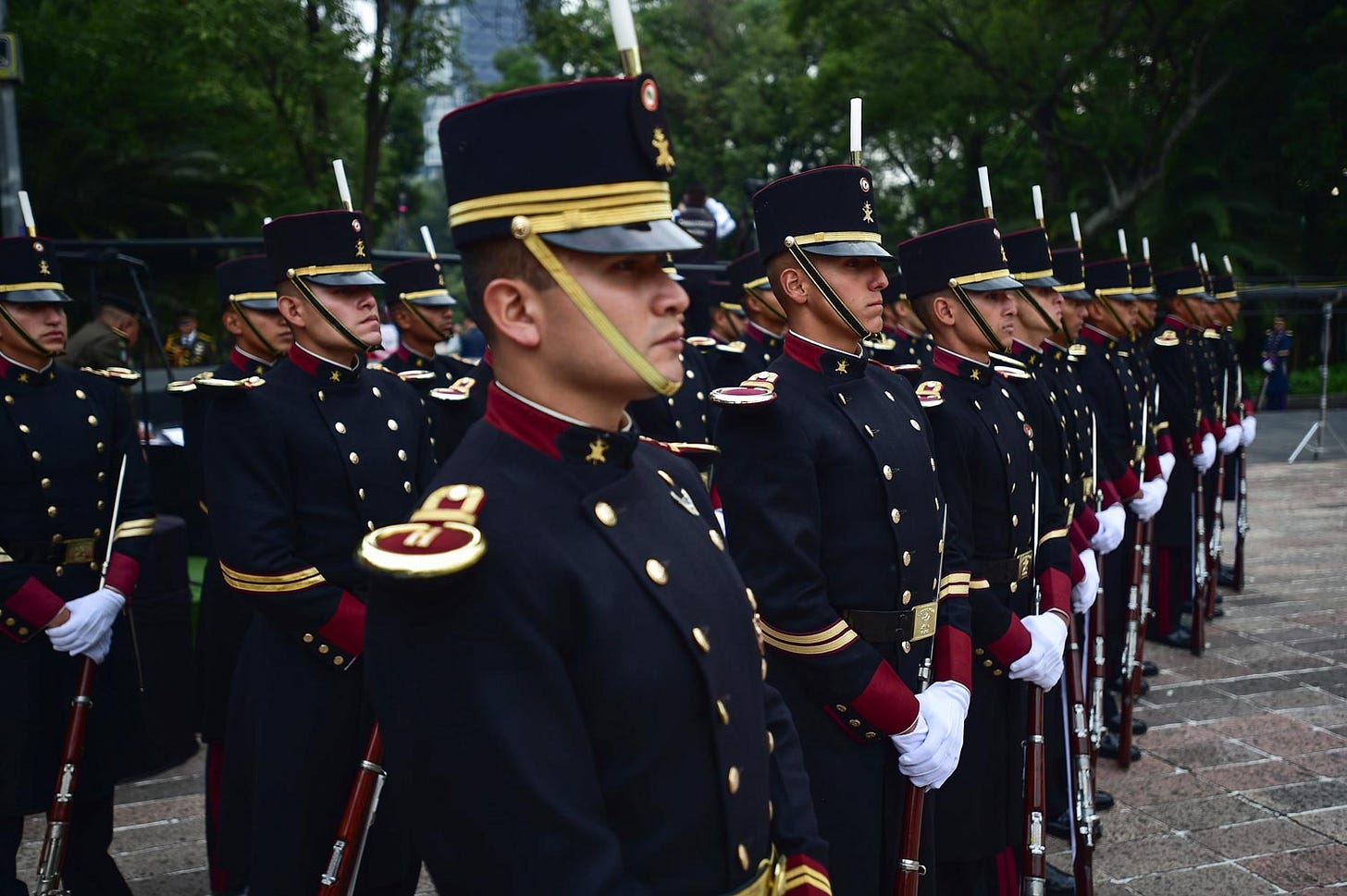Mexico's defence secretary: enough with the criticism
Gen. Luis Cresencio Sandoval sends a stern message to critics of the military's increasing role in Mexican public security

Mexican defence secretaries seldom stray into political matters – at least publicly – preferring to instead lobby behind the scenes. But Defence Secretary Gen. Luis Cresencio Sandoval discarded that approach in a recent speech, ominously accusing opponents of the president’s plans for keeping soldiers in the streets of trying to “separate” soldiers from the people.
Decked out in a ceremonial dress uniform laden with medals and speaking from the “Altar a la Patria” below the Chapultepec Castle – a monument of Mexican nationalism, which honours the Niños Heroes, the six cadets who died defending the castle against U.S. soldiers in 1847, one of whom wrapped himself in the flag and threw himself from the castle’s cliffs to avoid it being captured – Sandoval gave a with-us-or-against-us speech, while invoking history and heroism, to chide critics. He said at the Sept. 13 ceremony:
“Those of us who make up the institutions are committed to ensuring national unity and we must discern those who, with tendentious comments generated by their personal interests and ambitions, seek to separate the Armed Forces from the trust and respect that citizens place in women and men who have the sensitive task of serving their country.”
The general’s comments came as Congress pushed through through an initiative presented by the Institutional Revolutionary Party (PRI) to amend a transitory article in the constitution so the military would remain responsible for public security until 2029. (See further down.)
The president also kept up his attack on critics of his government’s embrace of militarization – and his “hugs, not bullets” security policy – bizarrely accusing them on Wednesday of holding a fondness for fascism.
He even labeled the United Nations, “Conservative” – an epithet for all his opponents – including cosmopolitans, feminists and academics, among other. He mused at his Sept. 14 press conference:
“They are the only ones who are clouded, blinded, an irrational attitude and besides that hypocritical because they are admirers of fascists, they are supporters of the strong hand, practitioners - not theoreticians – of repression, torture, massacres, of serious human rights violations and now they want to pretend that they are champions of freedom and the defence of human rights”
AMLO’s discourse on actual fascists can be baffling: he has repeated told an old Mexican anecdote – with pride – that Benito Mussolini was the namesake of president Benito Juárez. AMLO even highlighted it in a UN General Assembly speech.
SEDENA: chaos if soldiers sent back to barracks
Sandoval has cut an increasingly controversial course through Mexican public life. Much of the controversy comes from the role of Mexico’s military in recent years as AMLO tasks SEDENA and SEMAR (the Navy Secretariat) with everything from building and operating airports to managing seaports and the customs service to organizing tourist trips to the Islas Marías (once an island penal colony.) Sandoval and his SEMAR counterpart, Admiral José Rafael Osuna Durán, regularly speak at AMLO’s mañanera (morning press conference) and appear in photos after meetings with politicians. (Politicians also seek out military brass as they prefer to pawn off public security functions on the military rather than invest in proper police forces).

Sandoval has taken it to another level. His words at the Altar a la Patria were interpreted as a warning for opponents of militarization. They followed a prediction of chaos is soldiers were sent back to their barracks before 2024 – the period AMLO decreed for SEDENA to assume control of public security. He said of the National Guard:
“If by the time this period expires, we can no longer continue to act in that area, we would run into problems with the (National Guard).”
Sandoval also raised a pair of longstanding SEDENA talking points on public security: the legality of soldiers performing public security tasks and the military never volunteering to be sent into the streets to confront drug cartels. The secretary said at the Sept. 9 AMLO presser in Zacatecas state:
“When we were directly incorporated into a public security role, the Defence Secretariat always, always asked to have a legal framework. … Neither the administrations that gave us that task nor the subsequent ones (ever) gave it to us. What situations did that bring? One where our personnel acted outside the law, on the knife’s edge, taking actions, carrying out orders. And it resulted in being imprisoned.”
Sandoval’s comments somewhat clash with those of his predecessor, Gen. Salvador Cienfuegos, who openly petitioned for soldiers to be sent back to their barracks. He told an audience in late 2016:
“Do you want us [back] in our barracks? Let’s do it. I would be the first to raise both hands so that we do our constitutional duties. We didn’t ask to be there. We don’t take any pleasure in it. None of us …. were trained to pursue criminals.”


Security analyst Alejandro Hope took issue with the defence secretary’s assertion that the National Guard would fail without SEDENA’s leadership – putting public security at risk. Hope tweeted:
“If the National Guard is not ready ‘to face the serious problem of insecurity,’ neither is the army. There is no difference in uniform. And how do they know it’s not ready and how will they know in the future? What metrics will they use?”
A non-partisan military – with public approval
Mexico’s military exited the political scene in the 1940s as the generals from the Revolution earlier the century passed on. PRI politicians long boasted that Mexico avoided the coups common in South America – a point used to justify their idiosyncratic and authoritarian system . But the army struck a bargain with the PRI: it stayed out of politics – to a degree: the PRI had a quota for former officers in Congress and some were appointed governors – while civilian oversight was scant.
SEDENA and SEMAR are overseen by a general and admiral; both institutions are notoriously hermetic. A political science professor told this newsletter that few academics are able to study the military due to a lack of access and cooperation. Security analyst Alejandro Hope recently noted that no secretary of defence has ever failed to finish his six-year term.
The military polls highly, however, in public opinion surveys and consistently ranks as one of the country’s most trust worthy institutions – usually vying for the spot with the Catholic Church and National Autonomous University of Mexico (UNAM). It’s a point not lost on AMLO, who calls the military, “El pueblo uniformado” (the people in uniforms) – a nod to its popular appeal, mostly popular class origins and supposedly incorruptible nature (a myth long nurtured by top brass and perpetuated by AMLO.)
Seventy-one per cent of Mexicans consider the armed forces the most trustworthy institution in Mexico, according to the state statistics service INEGI. It’s a point not lost on AMLO, who has hammered the point home as he pushed for SEDENA to maintain its leadership role in public security. He said of its supposed probity:
“Times have changed and now we have the challenge of guaranteeing peace within the country. We have an institution that has elements, facilities, schools, discipline and preparation to help; it is not linked to vested interest groups or the oligarchy. Where are the scandals of the corrupt military? The Army is not like others.”
An incorruptible institution?
AMLO’s portrayal of the army as an incorruptible institution raised eyebrows. The defence secretary prior to AMLO assuming office was arrested upon arriving at LAX and accused of assisting a drug cartel. (The charges were withdrawn in the United States and Gen. Salvador Cienfuegos returned to Mexico, where he has never been charged.) Anti-drug tsar Gen. Jesús Gutiérrez Rebollar was convicted in the late 1990s of taking bribes from the Júarez Cartel.
Historian Harim B. Gutiérrez compiled a long list of SEDENA scandals, noting several generals who became notorious PRI governors. He also asked, “If the (armed forces) were so resistant to corruption, how was it possible that in 1985 Rafael Caro-Quintero had hundreds of hectares of marijuana and thousands of peons harvesting at El Búfalo ranch in Chihuahua?”
DEA agent Enrique “Kiki” Camarena was murdered at El Búfalo in 1985 – with Caro-Quintero (recently recaptured) convicted of the killing.

PRI LEADER ‘EXTORTED’ INTO SUPPORTING MILITARIZATION?
The lower house of congress on Wednesday approved an amendment to a transitory article in the constitution, extending SEDENA’s authority over public security until 2029 – with the PRI voting with the ruling MORENA party and its allies.
PRI president Alejandro Moreno (pictured in the cartoon) introduced the amendment, which quickly won AMLO’s approval. It followed the party and the rest of the opposition voting less than two weeks earlier against an AMLO proposal to put the National Guard under SEDENA command, even though the constitution states the force must retain civilian leadership.
The PRI proposal – which Sandoval personally promoted to PRI lawmakers – threatened to unravel the likely opposition electoral alliance for 2024 as National Action Party (PAN) and Democratic Revolution Party (PRD) bitterly objected. The proposal also carried the stench of extortion and Moreno – nicknamed “Alito” (like the Supreme Court justice) – saving has own skin as AMLO and MORENA politicians dug up incriminating dirt on the PRI president, leaking recordings of embarrassing phone conversations and the Campeche state prosecutor’s office raiding his home.


Negotiating impunity?
PRI lawmakers mostly followed its party president, who earlier in the September boasted of voting against militarization.
A lone MORENA lawmaker, Inés Parra Juárez, voted against the initiative, stating plainly she could not accept “militarization in exchange for Alejandro ‘Alito’ Moreno’s impunity.”

Even one of the people involved in exposing Moreno’s excesses seemed unsettled by the appearance of AMLO – the man who promised to eradicate corruption, but plays anti-corruption politics rather than promote anti-corruption policies and institutions – striking a deal with an unpresentable politicians looking to save his skin. Writing in the newspaper El Universal, columnist Hernán Gómez, a voice sympathetic to AMLO, said:
“It leaves a bad taste in the mouth when we see extortion normalized, when we notice once again that the application of justice in Mexico continues being subject to political criteria.
“Perhaps, at the bottom of this, it’s an attempt at dynamiting the alliance [between the PRI, PAN and PRD] and ensure triumphs in the 2023 elections in Coahuila and Mexico State and the presidential [election] in 2024. If it’s about this, the operation [against Alito] will end up producing results because the alliance is already taking on water.”
An unwieldy electoral coalition
The Va por México coalition – an amalgam of the once-mighty PRI, the conservative National Action Party (PAN) and left-leaning Democratic Revolution Party (PRD), which twice ran AMLO as its presidential candidate until he left to found MORENA – formed to confront AMLO after being annihilated in the 2018 elections. But it proved only modestly successful, stopping MORENA from winning a super majority in congress in the 2021 midterms and taking half the boroughs in Mexico City – long-dominated by AMLO. But it lost the vast majority of the governors races – with MORENA now holding 22 governors’ mansions.
AMLO appears to have pried the alliance apart. Mexican political analyst Jorge Fernández Menéndez observed:
“The last week, it’s impossible to deny, was one of the most successful for the López Obrador administration. Although constitutional conflicts exist … the truth is that he succeeded in having maintained automatic pre-trial detention [which the Supreme Court upheld after AMLO lobbied for it], legally placing the National Guardia the orbit of (SEDENA) and, in that debate, the opposition PAN, PRI, PRD alliance has broken, at leas in his current form.”





